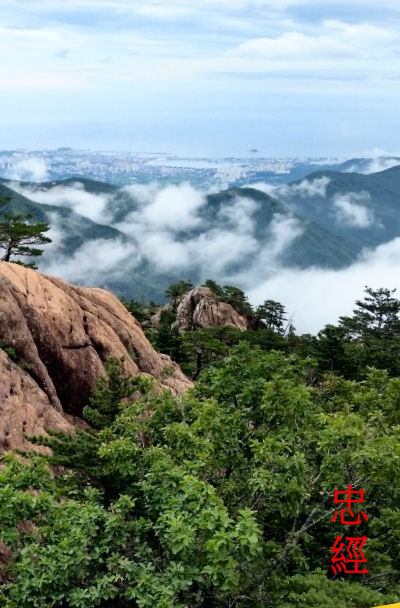忠經 Zhong Jing #5
守宰章 Protect Official Chapter

(PD) Mt Seoraksan Republic of Korea
Skies, earth, footprint...
(Photo clarity, angle, and wording by Larry Neal Gowdy)
Copyright ©2019 October 26, 2019
The fifth chapter of 忠經 (Zhong Jing) is titled 守宰章, which is loosely interpreted to be Protect Official Chapter.
The general theme of chapter #5 most focuses on the idea that administrators of nations and offices ought to be knowledgeable and level-headed. The idea of 'level' implies a rational mind, a mind that is inwardly calm, peaceful, and not leaning to one side, like a calm pond that is able to weigh facts and differences of opinions without favoritism. Today, it may require quite an active imagination to picture in one's mind an official of any culture that is knowledgeable, calm, and level-headed.
The following quotes are draft translations of portions of sentences within 忠經 Zhong Jing chapter 5 守宰章. Several of the words are given with accompanying synonyms that help to present an active concept.
Be official only bright-understanding
Attend-official-functions matter-thing only level-flat-peaceful
Stand life only clear-distinct
Official not bright-understanding then matter-thing numerous cheat-deceive
Matter not level-flat then hatred-blame-resentment-complain difficult stop-end
Life not clear-distinct then ask, use instruct citizens?
When the leaders of a nation are themselves upright, straight, and not bent of morals, then the public might choose to imitate the leaders. The common person follows, does not self-lead, and the common person looks for someone to follow... the common person imitates the leaders' behaviors, and if the leaders themselves are unfair towards people, then there is no reason to expect the people to be fair.
Clear-distinct then nothing desire
Level-flat then not crooked-wrong-false
Bright-understanding capable correct custom
It has been reported that there are thousands of new laws written each year in each state, more laws than a single individual could possibly read. The complexities of laws exceed the possibility of an individual to know what laws must be obeyed... the laws are not clear-distinct, nor level, and much worse is that the laws change daily... what might have been legal this morning, might be illegal this afternoon. If a law can be changed, then the law was never valid, and, the new law must therefore be similarly invalid. The only laws that are always true, and can never be changed, are the laws of Nature. A wise level-headed official, of bright understanding, would enable customs that are correct relative to Nature's way.
Guide it use social-customs cheerful-happy
Use harmonious its qi-ki
Creativity does not occur without harmony, but where there is harmony, there is also a form of 'energy', perhaps an energy that could be alluded to as a qi (chee or ki, depending upon an individual's preference of pronunciation). A harmonious people are with a stronger bond than what any law is able to force.
Balanced-weight noble virtue
Use cloth virtue
Honest-sincere noble change-transform
Use behavior change-transform.
The idea of 'cloth' is of it being woven, of woven strings longways, of like in the book's title 忠經 (Zhong Jing) Devotion Weave, and also within 道德經 (Dao De Jing) Way Virtue Weave. Virtue is not a singularity... a good virtue, is woven into one's life, throughout one's life.
A good virtue changes, and transforms, one's self, both in the present, as well as in the future.
Bright-understanding nation law use
Reach-arrive when not-have punish
And there is a good ideal to strive for, for a nation to possess intelligent laws that the people wish to follow, and to have a day arrive when all citizens happily live within the laws... punishments of people not following the social harmony, no longer exist.
Cold-poor-tremble person-ist clothes it
Hungry person-ist food it
Then people love it
Similar love their parents
Citizens bosom their kindness-charity
Have together-similar bone meat
When the cold and poor have clothes, when the hungry have food, then the people love their culture like a love for parents... citizens bosom kindness. The book's ideas appear to point to a culture where all of the people want to be kind, while the book does not appear to point to a culture that is forced by unfair socialist-like laws of handouts.
The other sentences within the chapter also speak of similar as the above sentences. The chapter's words are indeed highly idealistic, but, not completely. Similar cultures could exist today, if the people chose, instead of waiting for someone else to hand the people a prefabricated system of laws and customs.
"Find what you really care about, live a life that shows it." (Kate Wolf, 1977, You're Not Standing Like You Used To). As always, it is one's own choice.